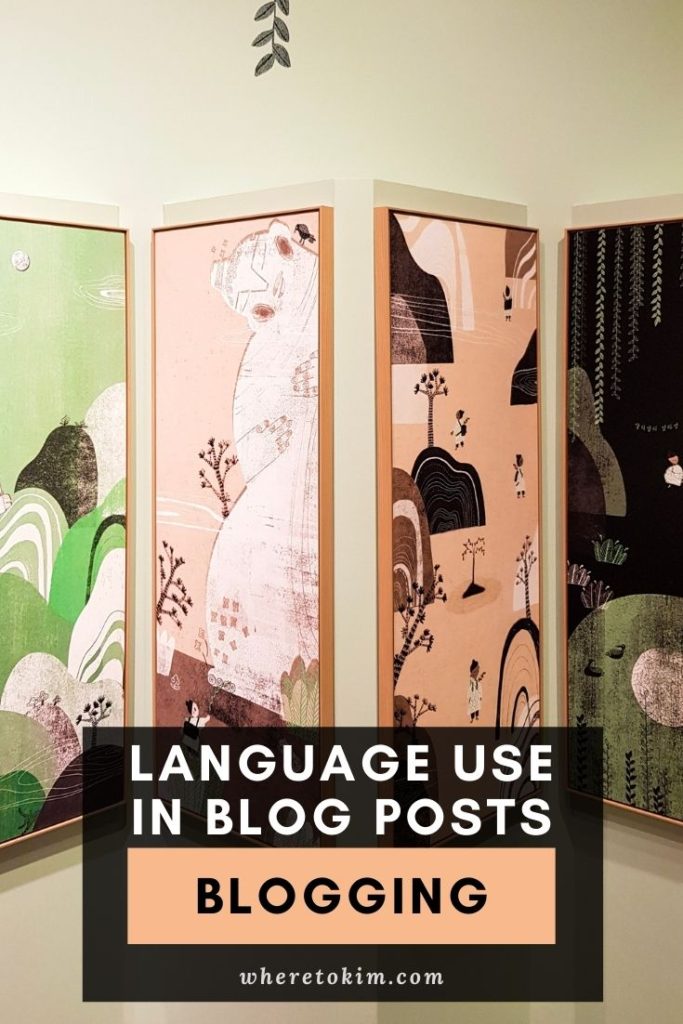A writer of blog posts has many signaling devices at his or her disposal. The layout is one, language use another. Some practices are statistically proven to resonate better with an audience, increasing the daily visitors your blog gets. But should you use all these proven tools just because they work, or instead, stay true to yourself?
The short answer: they help you on your road to success so if that’s your goal, use them.
My answer: some of them annoy me when I visit other blogs and websites. So I might be destroying my road to success, but I will create something that feels successful to me. Something that makes me proud when I look back at it ten years from now. And who knows, my strategy might work in the long run. I write for you, my readers, but I write for myself just as much. I target the person that I am because I also am a reader of WheretoKim. I am the researcher, the author, the reader, and the one getting inspired to experience more.
So, dear Kim, this is what I do(n’t do) to improve your reading experience.
1) Avoid words that trigger me in a bad way
My number one: I try to avoid words that annoy me when I read them myself. For example: quirky. This word actually tempted me to write this particular blog post.
I don’t want to shout too much by saying this is the ultimate, best, only [fill in the blanks] you will ever need. I know it is a good marketing practice, but when I see such headlines I often skip the search result. If your content is good you won’t need these words. You will however attract many people, perhaps more than I do with my blog posts. (Do look at the title of this blog post haha)
2) Use synonyms
I try not to repeat myself too much even though I like to talk about charming and picturesque views. That’s also how I would describe many of the places I visit, because, let’s face it, why would I be there otherwise. But I can’t describe every place I blog about like that. Who would take me seriously after following me for a while?
This is a hard one because it means I can’t express how visiting that place felt. Synonyms could help, but they would not be as on point as the two words I mentioned before. These words simply resonate with my feelings more than their synonyms that carry slightly different nuances.

3) Call for action
Should I end a post with a call for action or a summary of the post? If you are like me you’ll scroll up again to reread the paragraph that interested you the most, and not end your visit after reading the last paragraph at all. That’s why I am lazy with my call to actions… who are they for? Feel free to use what you read in a way that works best for you. You will know better than me what to do with it. I strongly believe in that.
4) Optimize for SEO
SEO aka the struggle between keeping a text readable and making it effective. At times my posts are SEO-optimized and at other times they optimize my mood and satisfaction instead (aka bad SEO). I should strive for SEO optimization so I can reach more people – and I will eventually – but right now I am happy with what I have written so far.

5) Encourage reading over scanning
Optimizing a post both for people only scanning a post and those reading it completely can be such a challenge. What helps here is to use signaling keywords to draw attention to important information. I like headings and short paragraphs, but I am less convinced about making words within a paragraph bold. Yes, it helps to call attention to something and it makes scanning the text easier. But do I want to stimulate scanning?
Not really, so while I occasionally make words bold (in some posts it just feels right), I often do not. Travel itineraries are an exception: here I make the highlights of a day bold to help you get a better grasp of what the itinerary is about, so you can easily decide whether it is for you or not.
6) Keep the end goal in mind
With my choice of words, I seek interaction with my readers. If you are responding to what you read – with that I don’t necessarily mean commenting to my posts, though that is also possible, but rather that you feel inspired, curious to know more, or are about to take action based on what you read – then I have succeeded. And sometimes I reread my own blog posts and respond to them in the same way as I hope you do.
Who do you write for? Or more importantly, why do you read?







